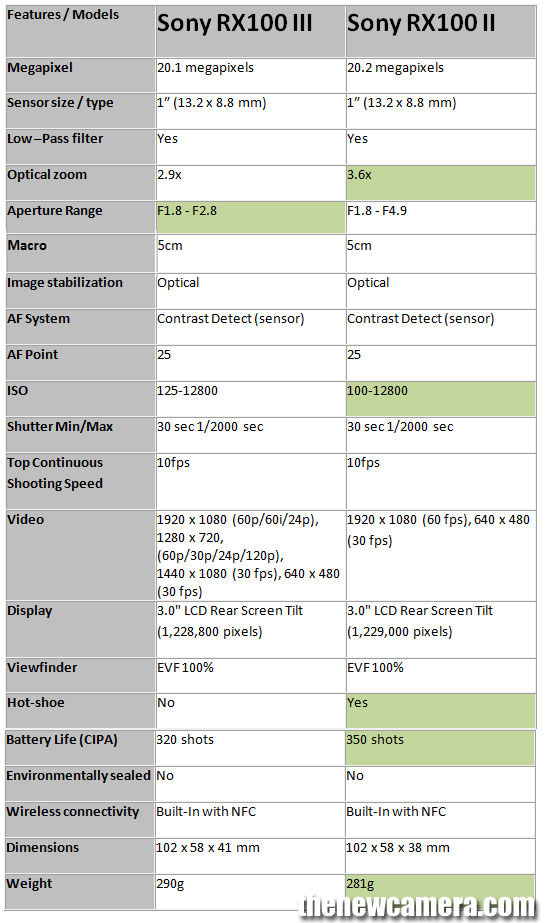
The RX100M3 is a successor of RX100 M2 camera, take a look below the table to see the major difference…

Sensor: Sony RX100M3 uses same sensor of RX100 M2 camera, but the image processor and the lens is new (mentioned below) so we may see some improvement in image quality.
Image processor: The BionzX image processor of RX100 M3 camera is approx three times faster than the Bionz image processor of RX100 M2 camera, the image processor is responsible for decoding RAW files to JPEG, AF speed, shutter lag and fast image processor naturally boost the overall operational speed of the camera.
Lenses: The lens losses some optical reach, Sony RX100 M3 able to do 2.9X optical zoom only and Sony RX100 M2 is able to do 3.6X optical zoom.
Improvement in Lens of RX100 M3 camera:
RX100 M3 comes with a improved aperture range – f/1.8 (W) – 2.8 (T) to f/11 on the other hand RX100 M2 aperture range is limited : f/1.8 (W) – 4.9 (T) to f/11, bright aperture lenses delivers more light to the sensor, hence you get more DOF and less noise in your images compared to RX100 M2.
The RX100 M3 Tele- close up range is much improved, the RX100 M3 Tele close-up AF range is 30cm on the other hand the RX100 M2 camera close-up range is limited to 55cm.
Better Background Blur – Due to close-up tele range the RX100 M3 camera gives very nice / creamy background blur compared to RX100 M2 when portraits are captured at Telephoto end (70 mm).
More wide coverage: The new RX100 M2 lens cover more frame compared to RX100 M2 camera (24-70mm vs 28-100 mm).
Inside the Lens: The Sony RX100 M3 lens is made up of 10 elements in 9 groups (including 9 aspherical elements), the RX100 M2 lens was made up of 7 elements in 6 groups (including 4 aspherical elements), due to the use of more and high quality aspherical elements,
Video: The frame rate remains same but new XAVC S recording format added (same as Sony A7s camera), audio recording format also get a facelift by adding Linear PCM (Pulse-code modulation – 2 channel).
Introduction of OLED pop-up viewfinder: The 0.39″ 1,440k-dot SVGA OLED Tru-Finder EVF added by Sony in RX100 M3 camera, the EVF’s optics feature a Zeiss T* anti-reflective coating to enhance visibility, the viewfinder also features eye sensor to detect your eye position.
The Hot-shoe is removed by Sony, it may bring disappointment to professional photographers since now there is no option left to use external flash or micro-phone.
Verdict: The RX100 M3 does have improved lens, new image processor, pop-up viewfinder and highest level of (XAVC S) video recording format available, but the sensor remains same as RX100 M2 camera, the RX100 M2 users may wait (if you feel these improvements are not enough for you) for Sony RX100 M4 camera but for new users we highly recommend you to buy Sony RX100 M3.







M2 only has EVF as an optional accessory. The built in EVF in the M3 is one of it’s main selling point in my opinion, along with the wider and brighter lens.
Don’t forget that the back LCD can flip 180 now, for those who want to take selfies. =)
ok
No reason to upgrade my MII…
Great article
However, my Sony RX100III has ISO settings from 80 — 12800 rather than the 125 — 12800 mentioned in the article.
The 24mm — 70mm equivalent focal range is limited; but does cover the majority of shooting situations and (for me) the viewfinder alone is worth the upgrade.